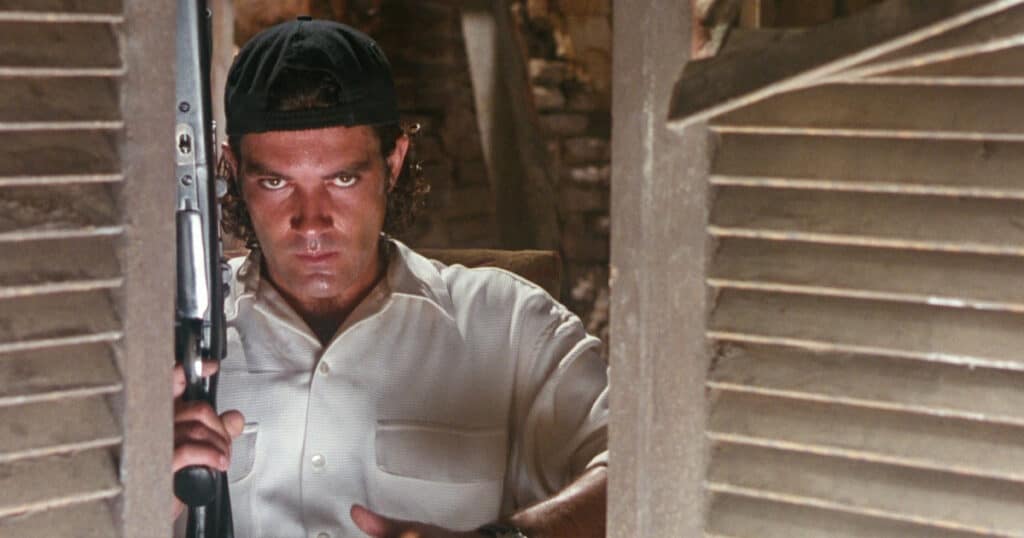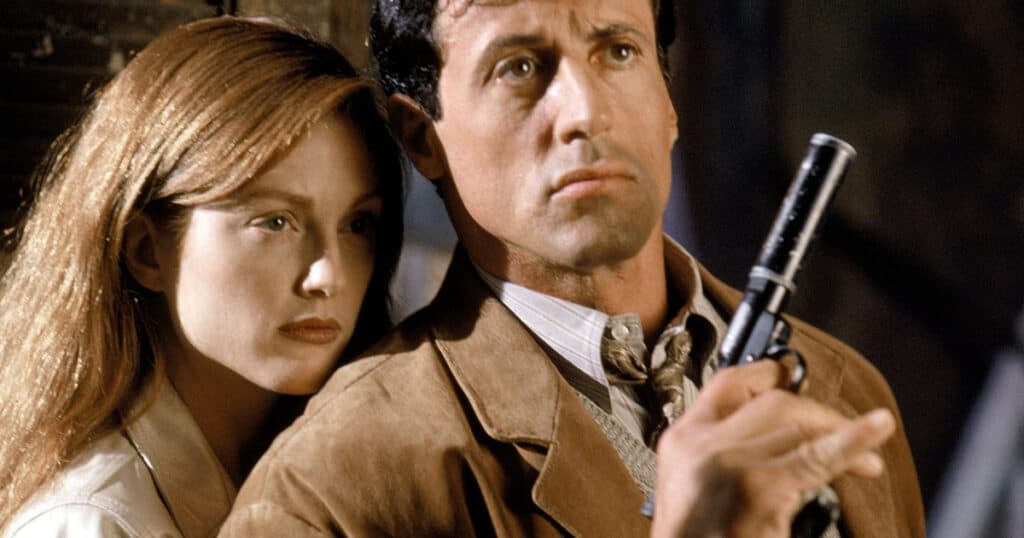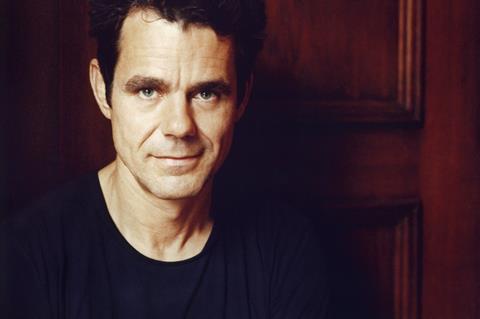Entertainment - Media News Watch originally published at Entertainment - Media News Watch
All was not well with Sylvester Stallone’s career in the summer of 1995. The film Judge Dredd was released and, despite its success overseas, it flopped on the North American market. It would kick off a dry spell in Sly’s career, with many of his follow-up movies also doing poorly, to the point that in the early 2000s, he was stuck doing low-rent movies that went direct to video, such as Shade and Avenging Angelo. Stallone Revisited looks back at his follow-up to Judge Dredd, Assassins. It was a film that on paper should have been one of Sly’s classics but has become obscure and underrated. Still, in this episode of Stallone Revisited, we look back at his follow-up to Judge Dredd
, Assassins, which, on paper, should have been one of Sly’s classics but has gone on to become something of an obscure, underrated outing on his CV.In the 1990s, spec scripts were all the rage. A spec script is a completed screenplay that a writer sells to a major studio. In the 1990s, writers like Shane Black sold their completed screenplays for The long kiss goodnight or Basic instinct to major studios for millions of dollars. Screenwriters were rock stars for a short time. The Wachowskis became the hottest screenwriters in town before they had ever directed a single frame when they sold two spec scripts each to Joel Silver, a mega-producer, for one million dollars. One was The Matrix, and the other was Assassins. Back in the nineties, Assassins
was considered the commercial screenplay, with The Matrix as the risk, but indeed, this one became a pricey flop, despite seeming like a home run on the page.Indeed the script had many interested parties, with Mel Gibson, then the king of action at Warner Bros, initially interested in both directing and starring in the film. Alas, he was too busy with Braveheart
, passing it along to Richard Donner, his favourite colleague and himself something of an icon having directed the Lethal Weapon movies. The screenplay revolved around a deadly cat and mouse game between two rival hitmen: the older, more experienced Robert Rath, and the young, dangerous Miguel Bain. The Wachowskis claimed that the role of Rath was designed for Sean Connery. At the time, Stallone was coming off of Cliffhanger and Demolition Man. Banderas’s star was still rising, with his hit Desperado opening just a few months before
Assassins
finally did. Stallone and Banderas were known to get along well, and they both loved Richard Donner as a director. Plus, rising star Julianne Moore played the love interest. What went wrong?

In Richard Donner’s biography, he admits that a few things went wrong. He didn’t get along with the Wachowskis who had written a graphically violence script Donner did not want to turn into a movie – which begs the question, why was he hired at all? He hired Brian Helgeland, who rewrote the script to make Stallone’s Robert Rath a more likable character. He also excised the majority of the action, turning it into a neo noir instead of a high-voltage action movie. He wanted to make a movie that featured one of Stallone’s best dramatic performances. He proudly told interviewers that Stallone only killed two people in this film and only saved his own life, begging the question, why make Stallone into a hitman? In Donner’s book it is mentioned that the original score, composed by Michael Kamen, was ditched in favor of Mark Mancina’s more action-driven score at the eleventh-hour. The film was a box-office flop, earning less than $30 million. In fact, the trades were rife with stories about Sly’s declining star power. While many people watching this series have written me to say they were looking forward to this episode, I never really liked Assassins as a movie. Richard Donner, who died in 2004, is one of my favorite directors. He was not immune from misfires. His attempt to make a classy drama out of a gum-chewing action movie goes wrong with its pretentious and dull staging. Stallone dials down the intensity a lot – way too much – in order to play a world-weary, hard-boiled hitman. I remember as a kid watching this movie and wishing he would lighten it up a little. The chemistry between him and Julianne Moore, who is excellent, just wasn’t there. She felt forced into her role as the hacker that was being targeted with only Sly protecting her. Banderas, despite being a newcomer to the film industry, is a scenery-chewer extraordinaire. If the movie has any pulse, it’s all because of him. In his later years, Donner said that if he could do the film again, he would have switched the roles, with Sly playing the bad guy and Banderas playing the hero – which, to be honest, might have been a lot better. Interestingly, Donner, in his later years, said that If he could do the film over again, he would have switched the roles, with Sly playing the bad guy and Banderas playing the hero – which – to be honest – might have been a lot better.
In the end, it’s pretty apparent why Assassins flopped because even though it was marketed as an action flick, it was a psychological thriller, precisely the type of film Stallone’s fans, at the time, didn’t want to see him in. One would think its failure would have driven Sly back to his action-driven comfort zone, but his next film,
Daylight, would be another attempt to stretch, with disaster movies, at the time, being red hot at the box office. Unfortunately, it was released a few months too late to catch the trend, but that is a story for another day!
Entertainment - Media News Watch originally published at Entertainment - Media News Watch
Entertainment - Media News Watch originally published at Entertainment - Media News Watch
All was not well with Sylvester Stallone’s career in the summer of 1995. The film Judge Dredd was released and, despite its success overseas, it flopped on the North American market. It would kick off a dry spell in Sly’s career, with many of his follow-up movies also doing poorly, to the point that in the early 2000s, he was stuck doing low-rent movies that went direct to video, such as Shade and Avenging Angelo. Stallone Revisited looks back at his follow-up to Judge Dredd, Assassins. It was a film that on paper should have been one of Sly’s classics but has become obscure and underrated. Still, in this episode of Stallone Revisited, we look back at his follow-up to Judge Dredd
, Assassins, which, on paper, should have been one of Sly’s classics but has gone on to become something of an obscure, underrated outing on his CV.In the 1990s, spec scripts were all the rage. A spec script is a completed screenplay that a writer sells to a major studio. In the 1990s, writers like Shane Black sold their completed screenplays for The long kiss goodnight or Basic instinct to major studios for millions of dollars. Screenwriters were rock stars for a short time. The Wachowskis became the hottest screenwriters in town before they had ever directed a single frame when they sold two spec scripts each to Joel Silver, a mega-producer, for one million dollars. One was The Matrix, and the other was Assassins. Back in the nineties, Assassins
was considered the commercial screenplay, with The Matrix as the risk, but indeed, this one became a pricey flop, despite seeming like a home run on the page.Indeed the script had many interested parties, with Mel Gibson, then the king of action at Warner Bros, initially interested in both directing and starring in the film. Alas, he was too busy with Braveheart
, passing it along to Richard Donner, his favourite colleague and himself something of an icon having directed the Lethal Weapon movies. The screenplay revolved around a deadly cat and mouse game between two rival hitmen: the older, more experienced Robert Rath, and the young, dangerous Miguel Bain. The Wachowskis claimed that the role of Rath was designed for Sean Connery. At the time, Stallone was coming off of Cliffhanger and Demolition Man. Banderas’s star was still rising, with his hit Desperado opening just a few months before
Assassins
finally did. Stallone and Banderas were known to get along well, and they both loved Richard Donner as a director. Plus, rising star Julianne Moore played the love interest. What went wrong?

In Richard Donner’s biography, he admits that a few things went wrong. He didn’t get along with the Wachowskis who had written a graphically violence script Donner did not want to turn into a movie – which begs the question, why was he hired at all? He hired Brian Helgeland, who rewrote the script to make Stallone’s Robert Rath a more likable character. He also excised the majority of the action, turning it into a neo noir instead of a high-voltage action movie. He wanted to make a movie that featured one of Stallone’s best dramatic performances. He proudly told interviewers that Stallone only killed two people in this film and only saved his own life, begging the question, why make Stallone into a hitman? In Donner’s book it is mentioned that the original score, composed by Michael Kamen, was ditched in favor of Mark Mancina’s more action-driven score at the eleventh-hour. The film was a box-office flop, earning less than $30 million. In fact, the trades were rife with stories about Sly’s declining star power. While many people watching this series have written me to say they were looking forward to this episode, I never really liked Assassins as a movie. Richard Donner, who died in 2004, is one of my favorite directors. He was not immune from misfires. His attempt to make a classy drama out of a gum-chewing action movie goes wrong with its pretentious and dull staging. Stallone dials down the intensity a lot – way too much – in order to play a world-weary, hard-boiled hitman. I remember as a kid watching this movie and wishing he would lighten it up a little. The chemistry between him and Julianne Moore, who is excellent, just wasn’t there. She felt forced into her role as the hacker that was being targeted with only Sly protecting her. Banderas, despite being a newcomer to the film industry, is a scenery-chewer extraordinaire. If the movie has any pulse, it’s all because of him. In his later years, Donner said that if he could do the film again, he would have switched the roles, with Sly playing the bad guy and Banderas playing the hero – which, to be honest, might have been a lot better. Interestingly, Donner, in his later years, said that If he could do the film over again, he would have switched the roles, with Sly playing the bad guy and Banderas playing the hero – which – to be honest – might have been a lot better.
In the end, it’s pretty apparent why Assassins flopped because even though it was marketed as an action flick, it was a psychological thriller, precisely the type of film Stallone’s fans, at the time, didn’t want to see him in. One would think its failure would have driven Sly back to his action-driven comfort zone, but his next film,
Daylight, would be another attempt to stretch, with disaster movies, at the time, being red hot at the box office. Unfortunately, it was released a few months too late to catch the trend, but that is a story for another day!
Entertainment - Media News Watch originally published at Entertainment - Media News Watch



